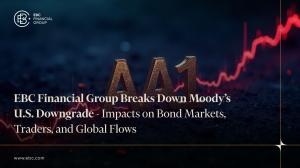EBC Financial Group Breaks Down Moody’s U.S. Downgrade: Impacts on Bond Markets, Traders, and Global Flows
With the U.S.'s final AAA rating removed, EBC analyses market reactions and highlights the long-term structural concerns now resurfacing
DC, UNITED STATES, May 21, 2025 /EINPresswire.com/ -- Moody’s recent decision to downgrade the United States’ long-standing Aaa sovereign credit rating to Aa1 has drawn attention across global markets. While the move aligns Moody’s with earlier actions by S&P (2011) and Fitch (2023), it nonetheless marks a significant moment: the removal of the U.S.’s final top-tier rating.
As the dust settles, EBC Financial Group (EBC) offers a breakdown of the immediate and structural implications for traders and institutional investors.
Markets React, but Fundamentals Drive the Conversation
The downgrade was announced after U.S. markets closed on Friday, and Sunday evening trading saw a brief dip across risk assets. However, U.S. equities and other major instruments regained much of their ground by Monday’s close.
According to David Barrett, CEO of EBC Financial Group (UK) Ltd, the market’s swift recovery suggests the downgrade was largely expected. “Moody’s has long been viewed as the outlier among the major ratings agencies. For many market participants, the interest lay not in the downgrade itself, but in the timing of the decision,” Barrett said.
Safe Haven Flows in Focus: Dollar Slips, Gold Strengthens
In the wake of the downgrade, markets reacted with a familiar pattern: a softer U.S. dollar and stronger demand for traditional safe havens. Gold prices edged higher as investors reassessed the risk landscape, while the dollar weakened modestly across several major currency pairs. Though short-lived, these movements reflect a well-established market dynamic—credit-related uncertainty often prompts rotation into assets perceived to offer stability.
EBC analysts note that while the dollar remains structurally supported by U.S. yields and economic resilience, any erosion of confidence in fiscal policy or creditworthiness may lead to periodic bouts of dollar softness and upside interest in commodities like gold.
Structural Concerns Highlighted by Moody’s
Moody’s cited a combination of persistent challenges underpinning its decision to lower the U.S. credit rating. These include the country’s expanding fiscal deficit, rising interest payment obligations, the potential extension and enlargement of tax cuts, and continued political polarization. While none of these issues are new, their cumulative weight—particularly in a high-rate environment—raises renewed questions about fiscal sustainability and long-term policy coherence.
“These are not new concerns,” Barrett noted. “But when underlined by a rating agency, they carry a renewed weight that markets will now have to consider more closely.”
While investors initially voiced concerns about potential ripple effects on institutional bond holdings, regulatory changes following the 2011 downgrade have largely exempted government debt from such triggers in many portfolios.
Bond Markets Offer a More Telling Signal
EBC notes that long-term U.S. bond yields—particularly the 30-year—have climbed back to levels last seen before key policy reversals in prior years.
“The bigger tell isn’t just the rating change—it’s in the bond market’s reaction,” Barrett said. “If back-end yields continue to climb, it may become increasingly difficult for the U.S. administration to contain volatility, especially in the absence of clear fiscal consolidation plans.”
Implications Beyond the U.S.: Focus Shifts to Global Carry Trades
Beyond the U.S., EBC also draws attention to Japan, where long-term bond yields have reached 40-year highs, prompting renewed scrutiny of the country's fiscal position. As noted in a previous feature with The Japan Times, Barrett discussed how shifts in Japan’s bond market could influence global carry trade dynamics—particularly given the scale of capital that has flowed from Japan into higher-yielding assets abroad. With significant sovereign bond ownership concentrated in the Bank of Japan, and growing attention on back-end yield movements, Japanese bonds may increasingly come into focus alongside their U.S. counterparts.
EBC remains committed to equipping traders with timely insights and analysis to navigate evolving macroeconomic trends with confidence.
For more information on EBC, please visit https://www.ebc.com.
About EBC Financial Group
Founded in London’s esteemed financial district, EBC Financial Group (EBC) is renowned for its expertise in financial brokerage and asset management. With offices in key financial hubs—including London, Sydney, Hong Kong, Singapore, the Cayman Islands, Bangkok, Limassol, and emerging markets in Latin America, Asia, and Africa—EBC enables retail, professional, and institutional investors to access a wide range of global markets and trading opportunities, including currencies, commodities, shares, and indices.
Recognised with multiple awards, EBC is committed to upholding ethical standards and these subsidiaries are licensed and regulated within their respective jurisdictions. EBC Financial Group (UK) Limited is regulated by the UK's Financial Conduct Authority (FCA); EBC Financial Group (Cayman) Limited is regulated by the Cayman Islands Monetary Authority (CIMA); EBC Financial Group (Australia) Pty Ltd, and EBC Asset Management Pty Ltd are regulated by Australia's Securities and Investments Commission (ASIC); EBC Financial (MU) Ltd is authorised and regulated by the Financial Services Commission Mauritius (FSC).
At the core of EBC are a team of industry veterans with over 40 years of experience in major financial institutions. Having navigated key economic cycles from the Plaza Accord and 2015 Swiss franc crisis to the market upheavals of the COVID-19 pandemic. We foster a culture where integrity, respect, and client asset security are paramount, ensuring that every investor relationship is handled with the utmost seriousness it deserves.
As the Official Foreign Exchange Partner of FC Barcelona, EBC provides specialised services across Asia, LATAM, the Middle East, Africa, and Oceania. Through its partnership with the UN Foundation and United to Beat Malaria, the company contributes to global health initiatives. EBC also supports the 'What Economists Really Do' public engagement series by Oxford University's Department of Economics, helping to demystify economics and its application to major societal challenges, fostering greater public understanding and dialogue.
Michelle Siow
EBC Financial Group
+60 16-337 6040
email us here
Visit us on social media:
LinkedIn
Instagram
Facebook
YouTube
X
Other
Legal Disclaimer:
EIN Presswire provides this news content "as is" without warranty of any kind. We do not accept any responsibility or liability for the accuracy, content, images, videos, licenses, completeness, legality, or reliability of the information contained in this article. If you have any complaints or copyright issues related to this article, kindly contact the author above.
dion seminara architecture Introduces Fully Integrated Architectural and Design Services in Brisbane
Valeriya Force Brings Tropical Passion With Her New Hit 'Thunder'
Medical Supplierz Showcases Cutting-Edge Medical Equipment from Verified Global Suppliers
Więcej ważnych informacji
 Jedynka Newserii
Jedynka Newserii

 Jedynka Newserii
Jedynka Newserii

Handel

Komisja Europejska chce wprowadzić ujednolicone przepisy dotyczące wyrobów tytoniowych. Europosłowie mówią o kolejnej nadregulacji
Ministerstwo Zdrowia opracowało nowy projekt przepisów wprowadzających kolejne zakazy dotyczące wyrobów tytoniowych – całkowitą eliminację e-papierosów oraz zakaz aromatów w woreczkach nikotynowych. Najprawdopodobniej w ciągu kolejnych dwóch–trzech lat Polska będzie musiała implementować nową dyrektywę dotyczącą wszystkich produktów tytoniowych, nad którym niebawem ma rozpocząć prace Komisja Europejska. Europosłowie mówią o ryzyku chaosu legislacyjnego, nadregulacji i wskazują na zagrożenia związane z proponowaną podwyżką akcyzy.
Konsument
Za trzy miesiące ruszy w Polsce system kaucyjny. Wątpliwości budzą kwestie rozliczeń i podatków

Zaledwie trzy miesiące zostały do startu systemu kaucyjnego w Polsce. Kaucje obejmą szklane i plastikowe butelki oraz puszki z napojami. To duża zmiana dla producentów napojów, sklepów i konsumentów oraz pośredniczących w zbiórce operatorów systemów kaucyjnego. Na razie przepisy są na tyle niedoprecyzowane, że budzą wiele wątpliwości w kwestii rozliczania podatków czy rozliczeń z operatorami. Producenci będą musieli płacić podatek od niezwróconych butelek, co zwiększy ich koszty.
Transport
Rośnie skala agresji na polskich drogach. Problemem jest nie tylko nadmierna prędkość, ale też jazda na zderzaku

Za kilka dni zaczynają się wakacje, czyli statystycznie najniebezpieczniejszy czas na drogach. Wśród głównych przyczyn takich zdarzeń na prostych odcinkach drogi są nadmierna prędkość i jazda na zderzaku. Zarządca autostrady A4 Katowice–Kraków w ramach kampanii „Nie zderzakuj. Posłuchaj. Jedź bezpiecznie” zwraca uwagę na zjawisko agresji na polskich drogach i przypomina, że bezpieczeństwo zaczyna się od osobistych decyzji kierowcy.
Partner serwisu
Szkolenia

Akademia Newserii
Akademia Newserii to projekt, w ramach którego najlepsi polscy dziennikarze biznesowi, giełdowi oraz lifestylowi, a także szkoleniowcy z wieloletnim doświadczeniem dzielą się swoją wiedzą nt. pracy z mediami.










.gif)

 |
| |
| |
|